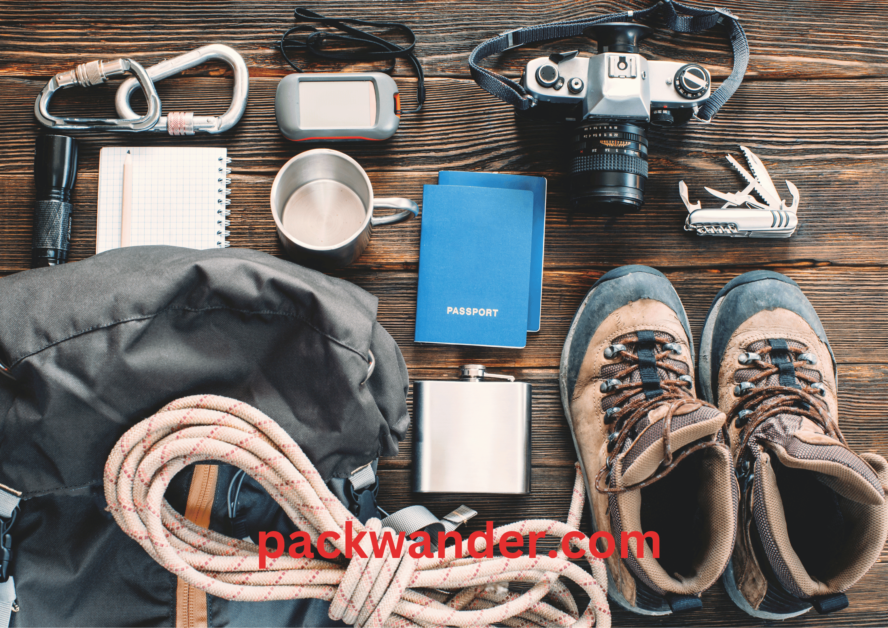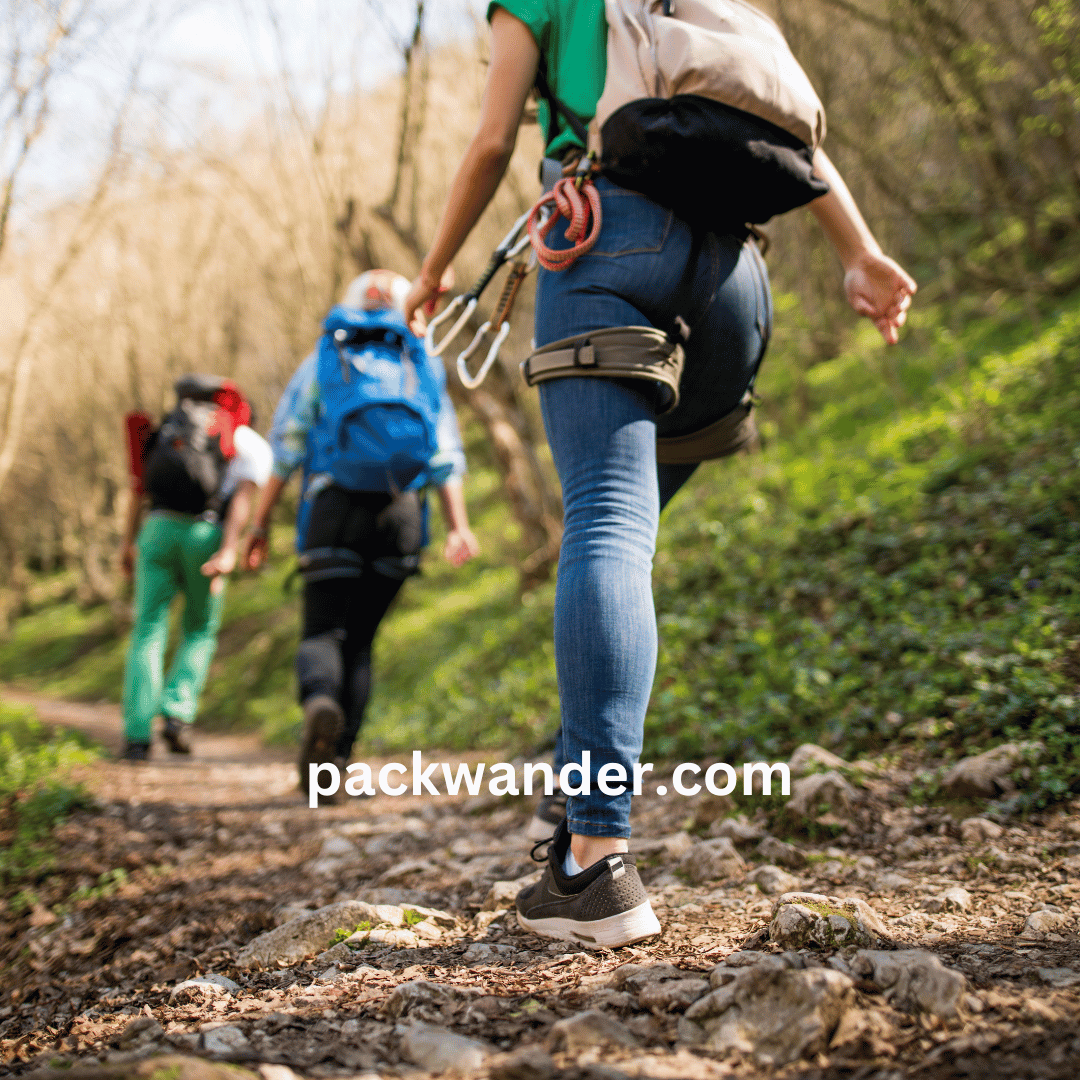A Beginner’s Guide to Hiking: Tips, Essentials, and Benefits
Hiking is an exciting adventure loved by people who enjoy nature. It’s not just walking in the woods; it’s a chance to explore beautiful natural places, push ourselves, and feel closer to the outdoors. As we put on our hiking shoes and start walking, we discover the wonders of the wild and feel better in our bodies and minds.
In a world that often feels very fast, hiking gives us a nice break. It lets us leave our phones and computers behind and enjoy the calm of nature. With each step, we hear the leaves rustling and birds singing instead of the busy city sounds. This helps us relax and feel refreshed.
Hiking has become really popular lately, and it’s easy to see why. It’s not just about having fun outside; it also has a lot of good effects on our bodies and how we feel. It makes our muscles stronger and gives us a sense of peace. It’s like a refreshing boost for everything we are.
Let’s explore the world of hiking together. We’ll learn what hiking is all about, find out what things are important for beginners to bring, talk about how to start hiking even if you’re not super fit, and discover the amazing ways hiking helps our minds, bodies, and friendships. So, get your hiking shoes on and let’s start this wonderful journey together.

What is Hiking? Exploring Nature’s Pathways on Foot
Hiking is a delightful outdoor activity that involves walking through natural landscapes, often on trails and pathways. It’s a way to connect with nature, enjoy the great outdoors, and experience the beauty of untouched environments at a relaxed and enjoyable pace. Hiking is more than just walking; it’s about immersing oneself in the sights, sounds, and textures of the natural world while getting some exercise along the way.
Understanding the Basic Concept of Hiking
At its core, hiking is about traversing trails and pathways on foot. It can vary in difficulty, from easy strolls on well-maintained paths to challenging treks through rugged terrain. Hiking allows individuals to explore a diverse range of landscapes, from lush forests and rolling hills to towering mountains and serene lakesides. Unlike more intense activities like rock climbing or mountaineering, hiking focuses on the journey itself, providing ample opportunities to appreciate the scenery, observe wildlife, and soak in the serenity of the environment.

Exploring Different Types of Hiking Trails and Environments
Hiking trails come in various forms, each offering a unique experience. Some trails wind through dense woodlands, allowing hikers to immerse themselves in the beauty of trees, plants, and wildlife. Other trails might lead to stunning viewpoints, rewarding the effort with breathtaking panoramas. Coastal trails grant glimpses of the ocean’s vastness, while desert paths showcase the stark beauty of arid landscapes.
Environments can range from:
- Wooded Trails: These paths meander through forests, offering shade and a chance to appreciate the tranquility of nature.
- Mountain Trails: Trails that ascend mountainsides provide challenges and stunning vistas from higher elevations.
- Coastal Trails: Along coastlines, hikers can enjoy the sight and sound of crashing waves and ocean breezes.
- Desert Trails: Trails in desert environments showcase unique flora and vast, open spaces.
- Countryside Trails: Rolling hills and fields offer a peaceful countryside experience.
The Allure of Hiking for Nature Enthusiasts and Adventure Seekers
Hiking holds a powerful allure for those who crave a connection with the natural world. Nature enthusiasts find joy in observing wildlife, identifying plant species, and experiencing the changing seasons up close. For adventure seekers, hiking presents a thrilling opportunity to conquer challenges, navigate varied terrains, and revel in the sense of accomplishment that comes from reaching a destination.
The appeal of hiking lies not only in the physical aspect of exploration but also in the mental and emotional rewards. It provides a chance to unplug from the demands of modern life, reduce stress, and find solace in the simple rhythm of walking and breathing in the fresh air. Whether you’re seeking solitude, seeking a physical challenge, or simply yearning to be surrounded by nature’s beauty, hiking offers an enriching and invigorating journey for people of all backgrounds and interests.
Hiking Essentials for Beginners or hiking gear list for beginners : Be Prepared and Enjoy Your Hike

When you’re new to hiking, having the right gear and clothing is super important. Here’s a list of 25 things you’ll need to make sure your hike is safe and fun:
- 1. Proper Footwear: Good hiking shoes or boots that support your feet and keep them comfy.
- 2. Comfortable Clothing: Wear lightweight, moisture-wicking clothes that let you move easily.
- 3. Layer Up: Bring extra clothes in case the weather changes. Layers assist in maintaining your optimal comfort, whether it’s warmth or coolness.
- 4. Sun Protection: Wear sunscreen, sunglasses, and a hat to shield yourself from the sun.
- 5. Navigation Tools: Carry a map, compass, or GPS to help you find your way.
- 6. Backpack: A comfortable backpack to carry your stuff in.
- 7. Hydration: Bring enough water to keep you hydrated throughout the hike.
- 8. Snacks: Energy-boosting snacks like trail mix, nuts, or energy bars.
- 9. First Aid Kit: Have bandages, pain relievers, and basic medical supplies just in case.
- 10. Knife or Multi-tool: Useful for various tasks like cutting, opening, or fixing things.
- 11. Flashlight: A small flashlight or headlamp in case it gets dark.
- 12. Whistle: To call for help if needed.
- 13. Extra Food: In case your hike takes longer than planned.
- 14. Rain Gear: A waterproof jacket or poncho to stay dry if it rains.
- 15. Hat and Gloves: Keep warm if it gets chilly.
- 16. Bug Spray: To keep pesky bugs away.
- 17. Hand Sanitizer: Keep your hands clean, especially before eating.
- 18. Camera: Capture the beautiful views and memories.
- 19. Personal ID: Carry identification and emergency contact info.
- 20. Cash: Just in case you need it.
- 21. Cell Phone: Keep it charged for emergencies.
- 22. Tissues or Toilet Paper: In case nature calls.
- 23. Plastic Bags: For trash or to keep things dry.
- 24. Extra Socks: Keep your feet dry and comfy.
- 25. Positive Attitude: The most important thing is to have fun and enjoy the hike!
Remember, the right gear and preparation can make your hiking experience awesome. Pack these essentials and you’ll be ready for a great adventure on the trails!
How to Pack a Backpack for Hiking?
How to Start Hiking When Out of Shape?

If you’re feeling a bit out of shape but still eager to explore the trails, hiking can be a fantastic way to get back into the swing of things. Don’t worry, you don’t need to be a fitness guru to enjoy the great outdoors. Here’s a step-by-step guide to help you start hiking and gradually build up your stamina:
- 1. Consult Your Doctor: Before starting any new physical activity, especially if you have any health concerns, it’s a good idea to check with your doctor to make sure hiking is safe for you.
- 2. Choose the Right Trail: Opt for easy, beginner-friendly trails that match your fitness level. Look for shorter distances and flatter terrains to begin with.
- 3. Start Slowly: Begin with short walks in your neighborhood or local park to get your body accustomed to walking on varied terrain.
- 4. Set Realistic Goals: Don’t rush it! Set achievable goals for each hike. Start with a short distance and gradually increase it as you feel more comfortable.
- 5. Invest in Proper Footwear: Get a pair of comfortable hiking shoes that provide good support and cushioning for your feet. This will make your hikes more enjoyable and reduce the risk of discomfort.
- 6. Practice Regular Walking: Incorporate regular walks into your routine. Start with a few minutes a day and gradually increase the time and intensity.
- 7. Warm Up and Stretch: Before hitting the trail, do some simple warm-up exercises and stretches to prevent injuries.
- 8. Hydrate and Fuel: Drink water before, during, and after your hike. Bring snacks like nuts or energy bars to keep your energy levels up.
- 9. Hike with a Friend: Hiking with a buddy can make the experience more enjoyable and provide motivation.
- 10. Listen to Your Body: Be mindful of your body’s sensations. If you begin to experience fatigue or discomfort, make sure to pause and allow yourself some breaks and relaxation.
- 11. Focus on Breathing: Practice steady and deep breathing. Inhale through your nose and exhale through your mouth to help you maintain a steady pace.
- 12. Enjoy the Scenery: Take time to enjoy the beauty of nature around you. Stop, observe your surroundings, and absorb the visual and auditory experiences.
- 13. Stay Positive: Don’t be too hard on yourself. Each stride you make marks progress, irrespective of its size.
- 14. Gradually Increase Difficulty: As you become more comfortable, gradually choose trails with slightly more elevation gain or longer distances.
- 15. Celebrate Achievements: Celebrate your milestones, whether it’s completing a certain distance or reaching a scenic viewpoint.
- 16. Rest and Recover: Give your body time to recover between hikes. This will help prevent overexertion and burnout.
Remember, hiking is about enjoying the journey and connecting with nature. By starting slowly, choosing suitable trails, and setting realistic expectations, you can gradually build your fitness and confidence while experiencing the joy of the outdoors.
Training for Hiking Beginners: Training Tips for Beginners

Before you tackle those longer or tougher hiking trails, it’s smart to prepare your body. Building up your strength and stamina helps you enjoy the journey and avoid unnecessary strain. Here is a straightforward strategy to commence your journey:
- 1. Understand Why Training Matters
- Training is like giving your body a friendly heads-up that you’re about to do something exciting. It helps prevent aches, tiredness, and injuries. So, before you dive into challenging hikes, spend some time training.
- 2. Start with Short Walks
- Begin with short walks around your neighborhood or a local park. This helps your body get used to moving and prepares it for more intense activities.
- 3. Gradually Increase Time and Distance
- As you feel more comfortable, gradually increase the time you spend walking and the distance you cover. It’s like leveling up in a game – you’re getting stronger bit by bit.
- 4. Strengthen Those Muscles
- Doing some simple exercises like squats, lunges, and push-ups helps make your muscles stronger. It’s like giving your body some extra superpowers for the hike.
- 5. Cardio: Walk, Jog, or Dance
- Do activities that make your heart beat faster – like brisk walking, light jogging, or even dancing. This helps your heart and lungs get ready for the hiking adventure.
- 6. Plan Regular Training Days
- Set specific days for training, and stick to your plan. Consistency is like having a friendly routine that your body starts to enjoy.
- 7. Warm-Up Routine
- Before any exercise, warm up by walking in place or doing gentle leg swings. This gets your muscles ready to move without any surprises.
- 8. Stretch It Out
- Stretch your muscles gently after warming up. Stretching is like giving your muscles a good morning stretch to wake them up.
- 9. Basic Stretching Exercises
Here are a few easy stretches you can try:
- Calf Stretch: Step one foot back, bend the other knee, and push your back heel down.
- Quad Stretch: Hold onto something and pull your foot towards your bottom, feeling a stretch in the front of your thigh.
- Hamstring Stretch: Sit down and reach for your toes, feeling a stretch in the back of your legs.
- Hip Flexor Stretch: Lunge forward, keeping your back leg straight and feeling a stretch in the front of your hip.
Remember, training is like practicing a new game before you play it for real. It helps you enjoy hiking more and makes the whole experience feel great.
Benefits of Hiking:

Hiking isn’t just about walking in nature; it’s a wonderful way to boost your overall health and happiness. Let’s look at how hiking gives you good things for your body, mind, and heart.
Physical Benefits of Hiking: Stronger Body
Hiking is like a workout that makes your body stronger. It helps your heart and lungs get fitter, and your muscles become more powerful. When you climb those hills or walk on uneven paths, your legs get a good workout. Plus, it’s a fun way to burn calories and keep your body in great shape.
Mental Benefits of Hiking: Clear Mind
Hiking is like a reset button for your mind. When you’re surrounded by nature, it’s like a breath of fresh air for your brain. It helps you let go of stress, anxiety, and worries. The quiet sounds of leaves and birds give your mind a peaceful break. It’s like giving your thoughts a chance to relax.
Emotional Benefits of Hiking: Happy Heart
Hiking can make your heart smile. When you’re out there, exploring the trails and enjoying the views, your mood gets a boost. It’s like a dose of happiness that nature offers. Plus, the accomplishment of reaching a summit or finishing a trail brings a sense of pride and happiness. It resembles a celebratory gesture for your cardiovascular system.
Connection to Nature: Feeling One with the World
Hiking lets you connect with the world around you. The beauty of nature is like a warm hug for your soul. It’s like having a chat with the trees and rocks. Being in nature makes you feel grounded, like you’re a part of something bigger.
Social Benefits of Hiking: Friends and Fun
Hiking becomes an even more enjoyable experience when shared with companions. It’s a chance to bond, share stories, and have fun together. It’s like a big adventure club where everyone’s invited. Plus, you can meet other hikers along the way, and it’s like making new friends with the same interests.
Overall Well-being: The Hiking Magic
Hiking is like a magic potion that brings goodness to your whole being. It makes your body strong, your mind clear, and your heart happy. It’s like a recipe for feeling great inside and out. So, whether you’re climbing high mountains or strolling through forests, hiking is your ticket to a better well-being.
Frequently Asked Questions (FAQs) about Hiking
How would you describe hiking?
Hiking is a delightful outdoor activity where you walk through natural landscapes like forests, mountains, or trails. It’s a way to explore nature, enjoy the outdoors, and experience the beauty of untouched places.
What is the full meaning of hiking?
Hiking stands for “hiking in nature’s kingdom.” It’s about journeying through natural environments on foot, connecting with the environment and getting some exercise while you’re at it.
What is the difference between walking and hiking?
Walking is a general term for moving on foot, often on paved surfaces or familiar paths. Hiking, on the other hand, usually involves more challenging terrains, like trails in forests or up mountains. It’s a bit like walking with an adventurous twist.
What is the purpose of hiking?
The purpose of hiking varies from person to person. Some do it for the physical exercise and health benefits, while others seek mental relaxation and a break from daily life. Hiking can also be a way to connect with nature, challenge yourself, or simply have a great time outdoors.
Conclusion: Your Journey Awaits, Embrace the Hiking Adventure
In this guide, we’ve explored the world of hiking and its many wonderful aspects. Hiking is more than just walking in nature; it’s an opportunity to discover new landscapes, challenge yourself, and connect with the beauty around you. No matter your fitness level, hiking is a welcoming path to consider.
Remember, you don’t need to be a super athlete to enjoy hiking. Whether you’re a beginner or someone who hasn’t been active in a while, there’s a trail out there for you. Start small, choose suitable paths, and gradually build up your strength and stamina.
Hiking brings a bundle of benefits. It’s like a gift for your body, mind, and soul. Physically, it strengthens your muscles and keeps your heart happy. Mentally, it clears your thoughts and refreshes your mind. Emotionally, it fills your heart with joy and accomplishment.
So, don’t hesitate. Lace up those shoes, grab a backpack, and step onto the hiking trail. Whether it’s a short walk in a nearby park or a challenging hike up a mountain, each step is a step toward a healthier and happier you. Embrace the journey, breathe in the fresh air, and savor the sights and sounds of nature. Your hiking adventure is waiting, and it holds the promise of a balanced and vibrant lifestyle.








I really like what you guys are usually up too. This kind of clever work and exposure!
Keep up the good works guys I’ve added you guys to my own blogroll.